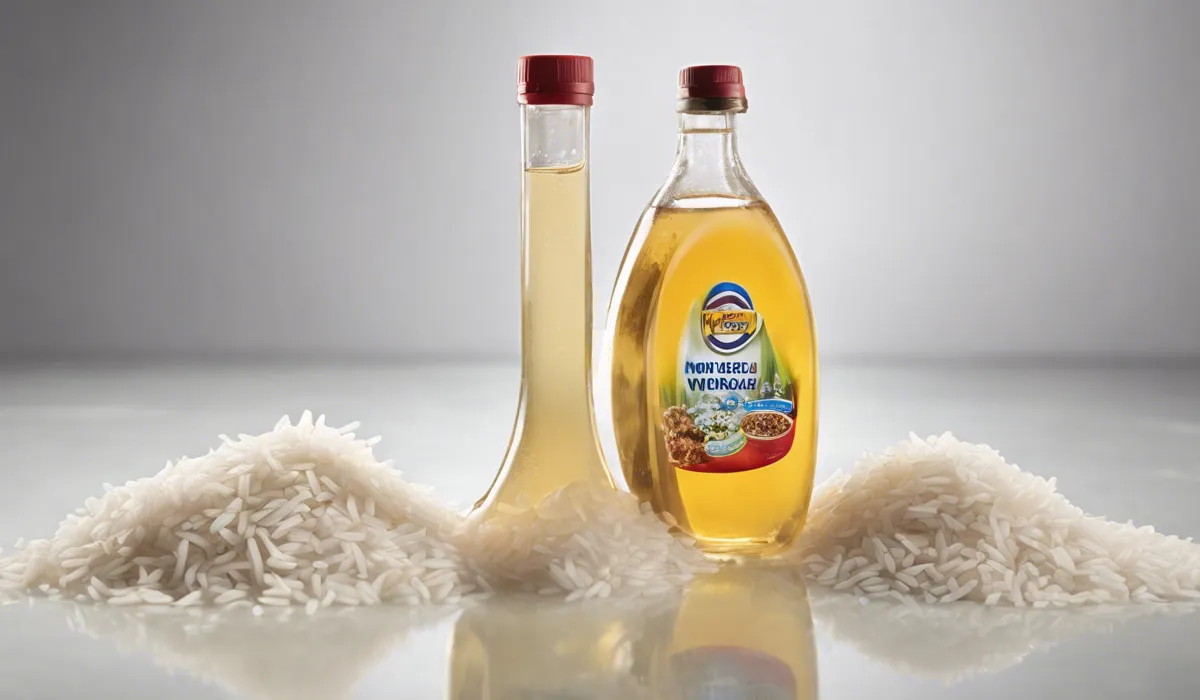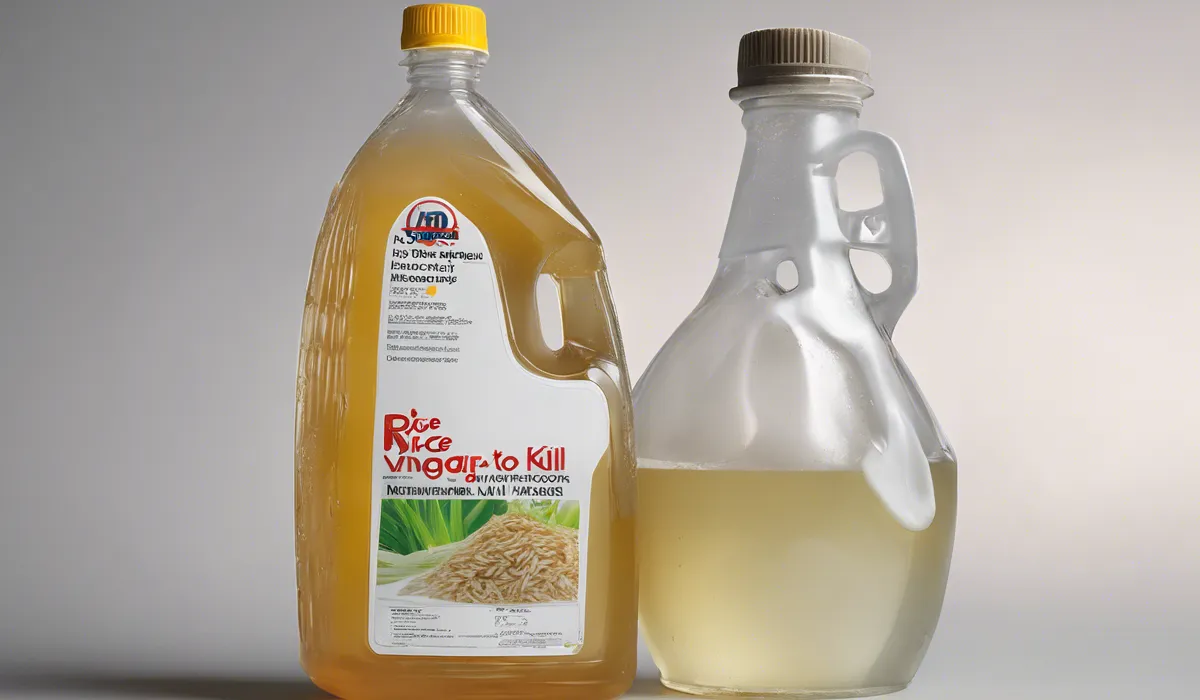Rice vinegar has mild acidic properties that can help clean surfaces but is not potent enough to kill mold effectively. For mold issues, stronger solutions like white vinegar or commercial mold removers are recommended.
The Antimicrobial Properties of Rice Vinegar

Understanding Acetic Acid in Rice Vinegar
Rice vinegar, a staple in many Asian cuisines, contains acetic acid, which gives it its sour taste and antimicrobial properties.
The acetic acid content in rice vinegar is typically around 4-5%, which is lower compared to other vinegars like white vinegar which often contains around 5-8% acetic acid.
This acid can break down cell walls of microbes, potentially killing bacteria and fungi on surfaces it comes into contact with.
Research on Vinegar as a Disinfectant
Several studies have explored vinegar’s potential as a disinfectant. These studies have found that vinegar can indeed kill a range of household pathogens.
However, rice vinegar’s effectiveness is generally mild compared to stronger concentrations of acetic acid found in other vinegar types, making it a less potent option for mold remediation.
Rice Vinegar’s Effectiveness Against Mold
When it comes to tackling mold, the acetic acid in rice vinegar may help in cleaning mold off non-porous surfaces but it is not potent enough to kill mold at its root.
Different types of mold can have varying levels of resistance to acetic acid, and rice vinegar may not be effective against all types.
Comparing Vinegars
While rice vinegar has some antimicrobial properties, white vinegar is often preferred for cleaning mold due to its higher acetic acid content.
Other types of vinegar, such as apple cider vinegar, may also be used for cleaning but like rice vinegar, they are generally less effective than white vinegar for mold remediation.
How to Use Rice Vinegar for Mold Removal?

Safety Precautions
Before using rice vinegar for cleaning, it is important to wear gloves to protect your skin and ensure the area is well-ventilated.
Although rice vinegar is a natural substance, its acidity can irritate sensitive skin and the respiratory system.
Application Guide
To clean mold with rice vinegar, one should apply it directly to the affected area, let it sit for several minutes, then scrub and rinse the area thoroughly.
This process may help in surface cleaning but might not address the root of the mold issue.
Prevention Tips
Using rice vinegar as a preventative measure rather than a treatment can be beneficial.
Spraying a diluted solution of rice vinegar and water on surfaces prone to mold can help keep them clean and reduce the likelihood of mold growth.
Limitations on Surfaces
Rice vinegar is not suitable for all surfaces. It can damage natural stone, hardwood floors, and some metals.
Always test a small, inconspicuous area before applying rice vinegar for cleaning to prevent damage.
Alternatives to Rice Vinegar for Mold Control

Commercial Mold Removal Products
Commercial mold removers are designed specifically to kill mold and its spores.
These products often contain chemicals like bleach or ammonia, which are more effective than rice vinegar in mold remediation but can be more hazardous to health and the environment.
Natural Alternatives
For those seeking natural cleaning options, tea tree oil, baking soda, and hydrogen peroxide offer varying degrees of mold killing properties.
Tea tree oil is a natural fungicide, baking soda can absorb moisture and odors, and hydrogen peroxide has strong oxidizing properties that can kill mold on surfaces.
Pros and Cons of Vinegar vs. Alternatives
Rice vinegar is safe, non-toxic, and environmentally friendly, making it an appealing choice for routine cleaning.
However, in comparison to alternatives like commercial mold killers, it lacks the potency required for serious mold infestations.
Natural alternatives might be more effective for mild mold problems while being safer than chemical products.
Professional Mold Remediation
In cases of extensive mold infestations or if the mold is located in hard-to-reach places, professional mold remediation may be necessary.
Experts have the tools and knowledge to safely and effectively remove mold, ensuring it does not return.
FAQs About Rice Vinegar and Mold
Can rice vinegar kill mold on surfaces?
Rice vinegar has mild acidic properties and may not be potent enough to kill mold on surfaces effectively.
Is rice vinegar a recommended solution for mold removal?
No, rice vinegar is not recommended for mold removal. Stronger solutions like white vinegar or commercial mold removers are usually advised.
What type of vinegar is best for killing mold?
White vinegar is considered more effective at killing mold due to its stronger acidity compared to rice vinegar.
Can I use rice vinegar for cleaning moldy surfaces if I don’t have white vinegar?
While you can use rice vinegar for cleaning, it may not be effective at killing mold. It’s better to use white vinegar or other mold-killing solutions.
Are there any natural alternatives to rice vinegar for mold removal?
Yes, natural alternatives like white vinegar, baking soda, and tea tree oil are known to be more effective at mold removal than rice vinegar.
Final Thoughts
While rice vinegar has some cleaning capabilities due to its mild acidity, it falls short in effectively killing mold.
Stronger solutions, such as white vinegar or specifically designed mold removers, should be used to address mold problems, ensuring thorough eradication and prevention of future growth.
Useful Resources
- https://www.hsph.harvard.edu/nutritionsource/food-features/vinegar/
- https://sonomacounty.ca.gov/health-and-human-services/health-services/divisions/public-health/environmental-health-and-safety/programs-and-services/food-safety-program/hazard-analysis-critical-control-points-(haccp)-plans/sushi-rice-haccp-guidelines-and-plan-templates
- https://extension.oregonstate.edu/ask-extension/featured/how-get-rid-mold-my-home
